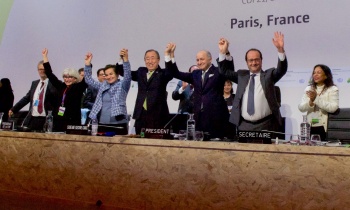A positive and human space

Finding common ground through quiet diplomacy
In the years leading up to 2015’s landmark Paris Climate Change Agreement, QUNO brought delegates and diplomats together in off-the-record meetings, to find common ground and a path forward through what had been often contentious international negotiations. Many participating negotiators credited our “quiet diplomacy” as playing a significant role, promoting an atmosphere of “higher purpose” in otherwise difficult negotiations. While imperfect, the resulting Paris Agreement proved to be much stronger than expected and a crucial step if humanity hopes to limit the risks of climate change.
Increasing greenhouse gas emissions are placing our climate on track for an unprecedented rate of temperature rise, threatening the survival of Earth’s ecosystems and species, including human beings. The United Nations Framework Convention on Climate Change (UNFCCC) was tasked with negotiating and adopting an ambitious international agreement to limit climate change risks. These negotiations were among the most complex and profound in human history, with countries from different economic, political, social and environmental circumstances seeking an agreement to address present concerns and protect future generations.
However, there was widespread frustration that the UNFCCC had existed for two decades without achieving significant progress. The negotiations were notorious for anger and division, culminating in a very public failure at the annual Conference of Parties (COP) in Copenhagen, in 2009, despite rising global emissions and ever more clear science of the existential danger.
It was out of this background, in 2011, that QUNO began attending negotiation sessions and talking with civil society and diplomatic communities to explore what role, if any, we could serve in supporting the process. Encouraged on various levels—including by a diplomat calling for Quaker support, having witnessed earlier QUNO work—we tested a version of our oft-practiced “quiet diplomacy.”
Our approach was simple, but not present at the climate negotiations: prioritize building communication and understanding between countries, rather than advocate for specific language or “asks.” Primarily through off-the-record group dinners, our goal was to create a space where negotiators were encouraged to speak personally, about their hopes, their fears and the assurances their delegations needed to move forward.
By 2015, we succeeded in having representatives from all negotiating “groups” around the table, including the highest greenhouse gas emitters and some of the poorest countries. Representatives from some 40 diverse countries ultimately attended our dinners leading up to the COP21 in Paris in December 2015, and many tell us that our work contributed greatly to a building of trust. “I come because I do not feel a deliverable,” said one negotiator years later, “I feel you do this for us.”
Following the adoption of the Paris Agreement, which created a global framework for climate action, we considered ending the dinners, but negotiators encouraged us to continue. Since 2013 we have held 19 dinners, and negotiators still tell us the dinners are a valuable, “positive and humane space” to talk more openly and build understanding.


